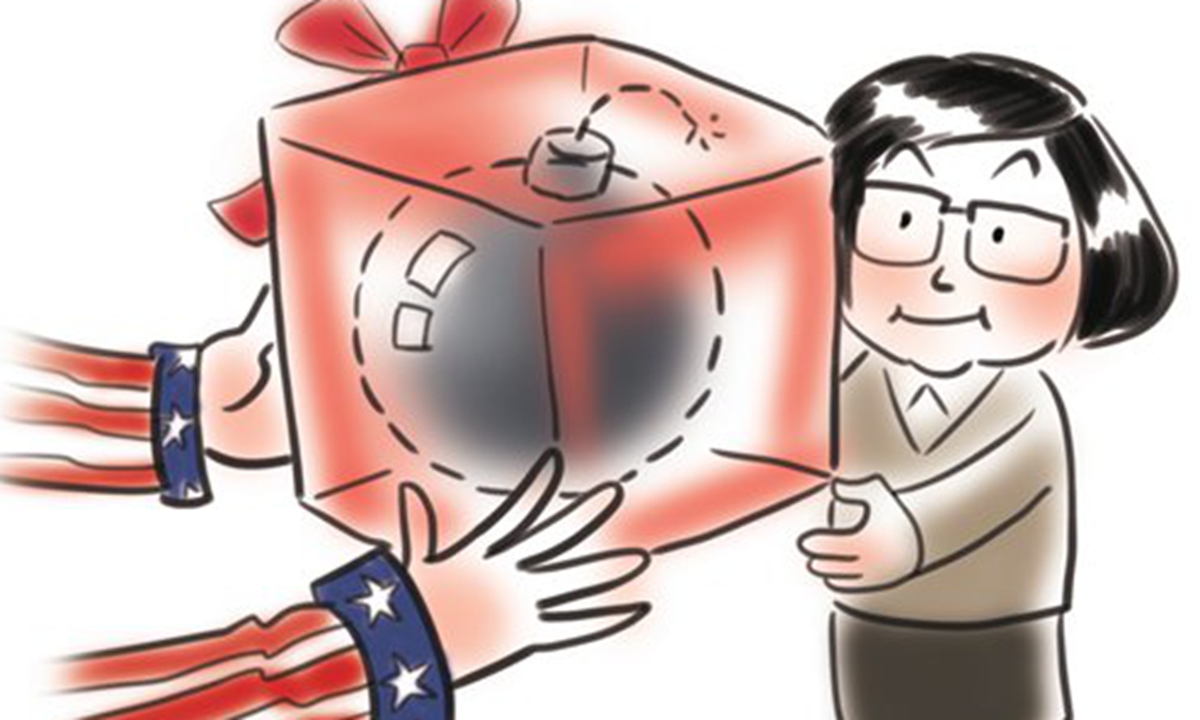Pentagon won’t sacrifice soldiers for non-core US interests
By Liu Weidong Source: Global Times Published: 2020/9/3 22:18:40

Illustration: Liu Rui/GT
The Pentagon's annual report on "Military and Security Developments Involving the People's Republic of China," released on Tuesday illustrates an overview of military imbalance in the Taiwan Straits. It warns that the People's Liberation Army is preparing to unify the island of Taiwan with the Chinese mainland by force, listing a range of China's military options to "invade" the island.The part was certainly not choreographed for the sake of Taiwan. It aims solely at China. The report coordinates with US President Donald Trump administration's China policy, providing excuses for Washington's tough strategy against Beijing.
This is a tacit Trump re-election tactic. The November elections are just around the corner. And the two presidential candidates are competing over who can be tougher on China. Trump needs Pentagon papers like this to magnify his macho rhetoric against China.
On the surface, the US has shown no intention to abandon the Three Joint Communiqués between the two countries, in which the US formally acknowledges there is only one China. However, quite a few of US words and deeds have already violated the one-China principle.
The Chinese side has already made clear: The day that a US Navy vessel arrives in Kaohsiung, Taiwan is the day that the PLA unifies Taiwan with military force. The US is well aware that neither military cooperation nor increasing arms sales will help the island withstand possible military strikes from the Chinese mainland. It simply believes that Taiwan is an easy card to play. It is therefore creating new legislations from time to time in an attempt to make the communiqués a mere ornament.
Washington has not publicly overthrown the one-China principle, because it does not wish to confront China militarily. Essentially, the US wants to deliver a message through hyping up the Taiwan question - the US is much stronger than China; it will do whatever it wants to; China is not capable to make the US behave; and Washington has a lot of ways to make Beijing uncomfortable.
The truth by constantly drawing the Taiwan card shows the White House has no other ace or joker up its sleeve. Washington has already exploited the human rights issue. Phase one trade deal was signed. Trump has no more energy to begin new negotiations over the phase two deal—because this will surely be much more difficult than the first one. He does not have time to win any advantage whatsoever to seek reelection points from economic issues. Therefore, the Taiwan question is the only card left and convenient to play.
Yet it is believed that Trump knows the bottom line. He cannot provoke a hot war with China. Otherwise, he will not find any support from American public. As a businessman, he could be construed as good at calculating the cost of whatever choice he makes. The US failed to achieve its desired results even in Iraq and Afghanistan after all these years of constantly sending US troops there, what possible result could it get from fighting a hot war against China?
Compared with politicians in the White House, the Pentagon must be far more cautious. The US front-line command system, such as the Indo-Pacific Command, is even more careful to avoid danger — especially a face-to-face conflict with a powerful rival. Granted, there are orders from the White House that the US military has to obey. But they will find ways to influence Washington's decision to prevent situation spiraling out of control.
Take the Taiwan question. If asked, the Pentagon can coordinate with the White House to stage a stunt. Yet if asked to fight in a real war, the Pentagon will doubtlessly emphasize possible, dreadful consequences.
The Pentagon has long hoped to put any scenario of confrontation with China into a controllable scope. Politicians are prone to have verbal diarrhea at any time. But soldiers fear misjudgment the most. The least thing they want is to stumble into a war. Because it will be the soldiers, not politicians, who will sacrifice first.
In terms of Taiwan questions, why would the Pentagon be willing to sacrifice American soldiers' lives for something that is certainly not the core interest of the US?
The author is a research fellow at the Institute of American Studies at the Chinese Academy of Social Sciences. opinion@globaltimes.com.cn
Posted in: VIEWPOINT